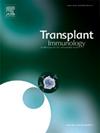Kidney transplantation after ABO-incompatible hematopoietic stem cell transplantation: A case report and literature review
IF 1.6
4区 医学
Q4 IMMUNOLOGY
引用次数: 0
Abstract
Although some studies have reported kidney transplantation for end-stage kidney disease after hematopoietic stem cell transplantation, few have reported kidney transplantation after ABO-incompatible hematopoietic stem cell transplantation. In this report, we describe a case of kidney transplantation after major ABO-incompatible HSCT and reviewed previous reports of kidney transplantation after hematopoietic stem cell transplantation. A 21-year-old male patient received major ABO-incompatible hematopoietic stem cell transplantation from an unrelated donor for B-lymphoblastic lymphoma. He developed chronic kidney disease requiring kidney replacement therapy because of drug toxicity and underwent ABO-compatible living donor kidney transplantation from his mother with standard immunosuppression. He had no anti-donor blood type antibody before kidney transplantation. Ten months after kidney transplantation, he is in good clinical condition with good renal function. Eighty-four cases of kidney transplantation after hematopoietic stem cell transplantation have been reported in literature. Among them, 25 recipients were from the same donor as hematopoietic stem cell transplantation. Out of these 25 recipients, 15 did not undergo maintenance immunosuppressive therapy. The low rejection incidence (14 %) and high rate of infection (32 %) and malignancy (10 %) suggest that kidney transplant recipients after hematopoietic stem cell transplantation are over-immunosuppressed. There were only three reports of kidney transplantation after ABO-incompatible hematopoietic stem cell transplantation, including the present case. Kidney transplantation may be an effective renal replacement therapy for end-stage kidney disease after hematopoietic stem cell transplantation, even in ABO-incompatible hematopoietic stem cell transplantation cases.
ABO不相容造血干细胞移植后的肾移植:病例报告和文献综述。
尽管一些研究报告了造血干细胞移植后终末期肾病的肾移植,但很少有报告称ABO不相容造血干细胞移植后进行了肾移植。在本报告中,我们描述了一例大样本ABO不相容造血干细胞移植后的肾移植病例,并回顾了以往关于造血干细胞移植后肾移植的报道。一名21岁的男性患者因患B淋巴细胞淋巴瘤接受了非亲缘供者的ABO不相容造血干细胞移植。由于药物毒性,他患上了慢性肾病,需要接受肾脏替代治疗,并在标准免疫抑制下接受了来自其母亲的ABO相容活体肾移植。肾移植前,他没有抗供体血型抗体。肾移植 10 个月后,他的临床状况良好,肾功能良好。已有 84 例造血干细胞移植后肾移植的文献报道。其中 25 例受者与造血干细胞移植的供体相同。在这 25 名受者中,有 15 人没有接受维持性免疫抑制治疗。排斥反应发生率低(14%),感染率(32%)和恶性肿瘤发生率(10%)高,这表明造血干细胞移植后的肾移植受者免疫抑制过度。包括本病例在内,仅有三篇关于 ABO 不相容造血干细胞移植后进行肾移植的报道。肾移植可能是造血干细胞移植后终末期肾病的有效肾脏替代疗法,即使在ABO血型不相容的造血干细胞移植病例中也是如此。
本文章由计算机程序翻译,如有差异,请以英文原文为准。
求助全文
约1分钟内获得全文
求助全文
来源期刊

Transplant immunology
医学-免疫学
CiteScore
2.10
自引率
13.30%
发文量
198
审稿时长
48 days
期刊介绍:
Transplant Immunology will publish up-to-date information on all aspects of the broad field it encompasses. The journal will be directed at (basic) scientists, tissue typers, transplant physicians and surgeons, and research and data on all immunological aspects of organ-, tissue- and (haematopoietic) stem cell transplantation are of potential interest to the readers of Transplant Immunology. Original papers, Review articles and Hypotheses will be considered for publication and submitted manuscripts will be rapidly peer-reviewed and published. They will be judged on the basis of scientific merit, originality, timeliness and quality.
 求助内容:
求助内容: 应助结果提醒方式:
应助结果提醒方式:


